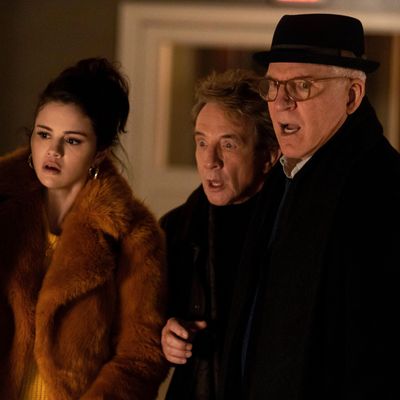
Only Murders in the Building feels like the kind of television show driven by that familiar, dangerous, intoxicating moment, where someone says, “Wouldn’t it be fun if …?” And then instead of the idea getting shut down because it’s too hard, or too strange, or clearly doesn’t make sense, everyone involved just … runs with it.
Wouldn’t it be fun to do a TV show send-up of true-crime podcasts? Wouldn’t it be fun to write a role for Martin Short where he gets to play to all of his biggest, silliest impulses but also gets to show his rarer poignant side? Hey, wouldn’t it be fun to do it classic whodunit style, with everything centered on a big, stodgy Upper East Side apartment building? (You could get a bunch of Broadway actors to show up as small characters; wouldn’t that be fun?) What if it juggled different narrators for each episode? What if there were a bassoonist played by Amy Ryan, and what if, for some reason, Sting showed up! What if you, Steve Martin, the creator of this show, also starred in it? What if you also get Selena Gomez to star in it! Does that make sense? Is that going to work? Unclear, but wouldn’t it be fun to try?
If you were to lay it out point by point and try to pin it all to a big wall, or stretch it out and plumb its anatomy for how it all fits together, you’d quickly discover that very little about Only Murders makes much sense. It’s true for the show’s internal mechanics — the mystery and the parodic podcast telling of it are full of absurdities and improbabilities and outright shrugs — and it’s also true for the meta-level concept of the show. Gomez is an odd fit as Mabel, a mysterious resident of the show’s titular building, but there’s pleasure in watching her clash against the show’s broader style; she’s destabilizing as one part of a triad where Steve Martin and Martin Short are the other two members. But eight episodes into the ten-episode season (the number of screeners sent to critics), I still hadn’t adjusted to the rhythmic differences between her performance and that of her co-stars. Only Murders tries to write its way through that problem: It’s generational! They come from different worlds! But the show never figures out how to integrate the stylistic glossiness and emotional bluntness of the Mabel sections with the rest of the series, which is all comic lightness and sharp, quiet moments of sadness.
In some ways, for some episodes and scenes, it just doesn’t work. And yet the spirit that seems to be animating everything in the series — don’t you think it’d be fun to try, though? — pulses through it all anyhow, as though Martin and the show’s other creator John Hoffman are sitting next to you on the sofa, smiling at the mismatched performance styles and enjoying themselves immensely.
It doesn’t hurt that there’s a rollicking quality to the whole thing, a playful energy that seeps into everything from the set designs to the casting to the chemistry between longtime creative partners Martin and Short. Martin’s character Charles is an actor who once starred in Brazzos, a crime procedural where he played a daring, jaded detective (named Brazzos, of course). There’s so much delight in all the goofy Brazzos stuff: the old re-created clips from this fictional show, Brazzos’s terrible tagline, Charles’s half-resigned, half-proud expression whenever someone recognizes him. Short’s character Oliver, a theater producer who hasn’t had a successful show in years, is a magnet for silly-sad Broadway in-jokes. Every ounce of it is “wouldn’t it be fun if …?,” followed by a string of ever-heightening descriptions of failed Broadway productions, all of it magnified by Nathan Lane, who plays another resident of the building who often funds Oliver’s productions.
It’d be pretty easy to fall into a trap of plausibility, to get caught on the impossible logistics of these three people actually producing a podcast under these conditions, or stuck on working out the unlikely events of the crime itself. That sort of thinking, applied to a show like this, is a route to frustration. Only Murders wants its viewers to really feel for its characters, but to treat all their surrounding true-crime paraphernalia like an elaborate, almost clownish Pink Panther–style setpiece. From that perspective, Only Murders absolutely achieves its goals, and the pleasure its creators seem to take in making it translates effectively into the experience of watching it. Effectively, but not effortlessly — you can still sense the moments where Only Murders works better in concept than in execution, the places it leaps and then lands with a bit of a wobble. But its flaws do not make it any less charming. For a show that seems born out of the spirit of “wouldn’t it be fun?”, the answer is clearly “yes.”





